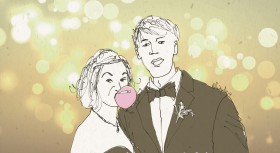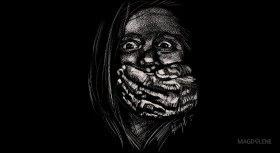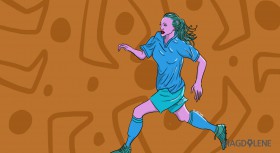To celebrate Magdalene’s 2nd Anniversary, we held a writing competition with the theme “Why I am Magdalene”, inviting our readers to write an essay on why they find themselves in Magdalene, and how its content and messages resonated with them. This piece won Honorable Mention in the competition.
People are capable of love is what they always say.
People can always learn to love is what we are taught.
What they often fail to highlight is that people are also capable of hatred, which they nourish to grow until it becomes rooted strongly, passed from one generation to another. The hatred becomes internalized within their construction of values, forming the basis of an ideology, in which people hate without even knowing why.
It becomes worse when the people at the receiving end of the hatred lose hope and give up on defending their rights. For many gay people, this is the turning point where they choose to stay in the closet, detach themselves from society, or put a mask on and silence their true heart in order to blend in. At least, that was how I used to live my life, living in a queer dimension of reality.
But, first, my family. Religiously conservative, they cling to the commandments of their faith and observe morality imposed by the majority. Though they have never explicitly spoken about banning homosexuality nor outwardly championing heteronormativism, I know that it is what they believe in. Gay people are not preferred because the majority does not accept them; freethinking is not justified because it does not conform to what the majority believes in.
My family never seeks to find out what is underneath the cover, because they have already decided to remain passive. To understand the way in which they are norm-referenced can be seen from their attitudes to marriage. Heterosexual marriage is sacred and obligatory to them. My two elder siblings are married and their marriages constitute and contribute to the values my family deems righteous.
Obviously, this affects me. Asides from the typical questions of, “When will you be married?” or remarks such as, “Later when you have a wife, you’ll understand”, what I don’t delight in the most is the expectation this creates of me. I longed for discussions about other options for those who don’t follow this path, and I wanted to initiating alternative discourses with my family regarding marriage and the underlying values of sexuality and wellbeing. However, I was not so strong.
I grew up living in tremendous fear. I don’t recall the first time I realized I might be interested in men, but I always have. Since childhood, I have been attracted to men, but I never did anything to express it. Instead I tried to kill the feeling. I wanted to be as “normal” as other boys, who were then busy falling in love with girls. Feeling a romantic attraction towards the opposite sex was the ticket I must have to blend in.
Magdalene does not display people’s experiences; it bespeaks the fragments of myself to which I always refused to listen.
As I grew older, my peers then began to pick on gay guys. Being teenagers we mocked them, polarizing the gays as “them”, in a very bad sense. I did it as well to cover myself. This went on even as I entered my adulthood, in university. I forced myself to succeed in relationships with women, because I was tired of living two lives. I became overwhelmed by the fact that
I had to fake my identity. Despite the pleasure I derived from and the desire I had for women, the part of me who is homosexual remained. I could not find a way out of living on this boundary. I could not choose to be completely heterosexual.
It was then that I started to flick through literature on homosexuality. I immersed myself among the pages of Foucalt, Butler, and other theorists who unpack the mystery of power, selfhood, and gender. They all helped me understand who I was and what was happening to me. By picking their brains, I finally learned to find love and peace within me. I no longer put the blame on myself. I started to care.
My newly found optimism led me to further learn about homosexuality and gender. My exploration into the digital world introduced me to Magdalene. From the moment I bumped into its articles, I knew I have fallen for it. Not only have I obtained advocacy, I also got connected with other “me” through the discourses. Magdalene does not display people’s experiences, it bespeaks the fragments of myself to which I always refused to listen. From each article, I found the complete self of me being reflected. Unlike my attempts to use theories only to study “me”, Magdalene also embraces me in-depth. With its holistic and realistic descriptions, homosexual and gender constraints are not only presented to be understood, they are confronted. Magdalene fuels me to go further to tolerate all things I had been against or taken for granted.
I can freely say that I love myself now. The love comes from the sense of understanding I would never have had, if I had not tried to occupy and explore the room I used to avoid due to the blind hatred.
From the love I finally have, I know I have the rights to negotiate with my family and other people about how my life is lived and how I deserve to be treated. I will not contest them, nor change their beliefs. Instead, I will try to make them love me as much as I do, because I believe bigger tolerance will go hand in hand with greater love. So I am going to strive for tolerance even if it takes time.
Tubagus Septian was born on September 10, 1992 in Bogor. He is currently a postgraduate student of education studies in Monash University, Australia. He is very fond of philosophies and contemporary literature.








Comments